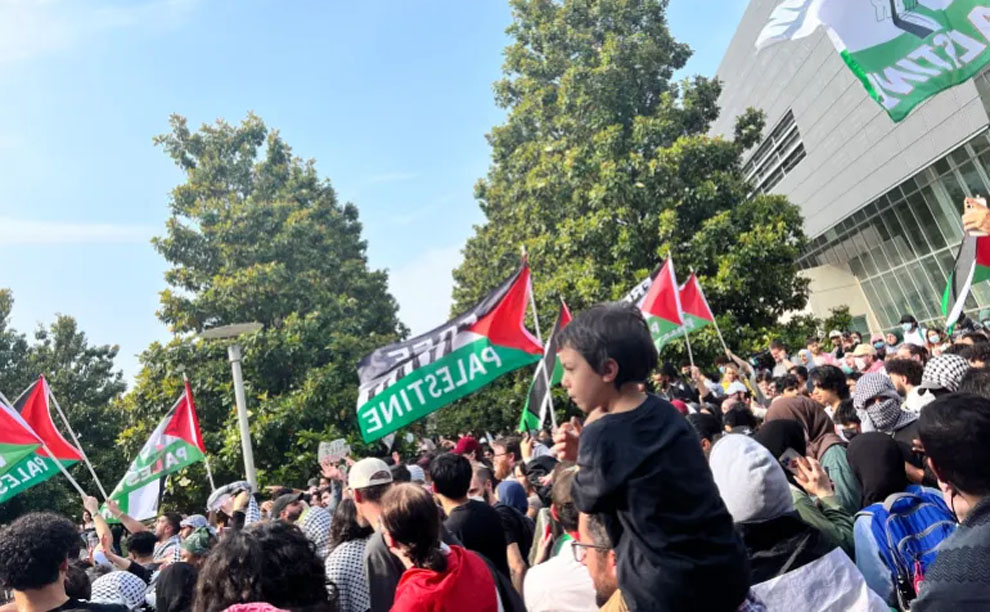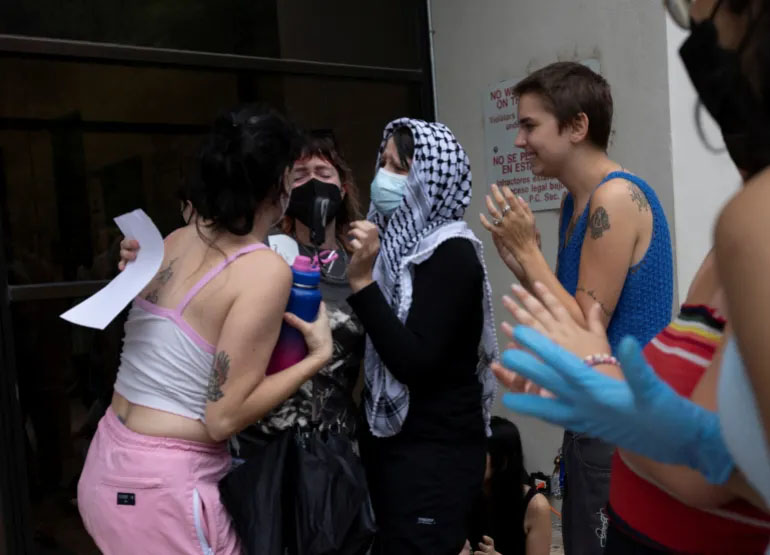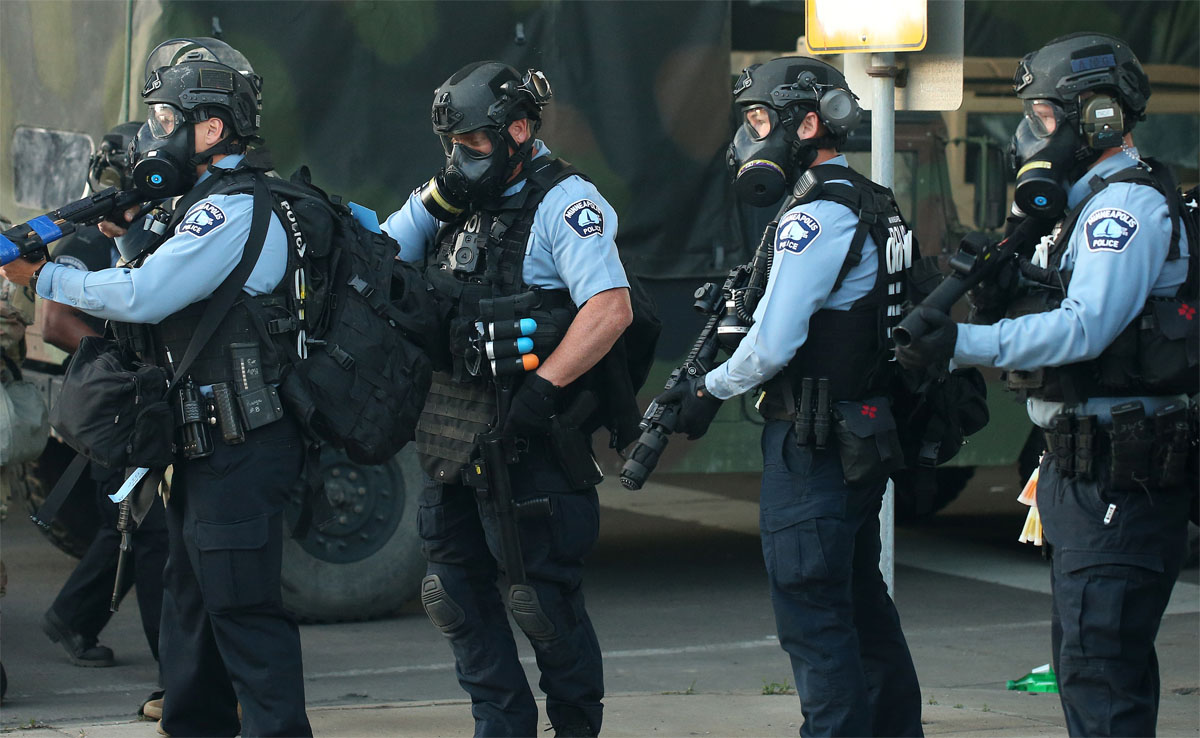International
In Texas, pro-Palestine university protesters clash with state leaders

In Texas, pro-Palestine university protesters clash with state leaders
Austin, Texas – “It didn’t feel real.” That’s how Alishba Javaid, a student at the University of Texas at Austin, describes the moment when she saw roughly 30 state troopers walk onto the campus lawn.
Javaid and hundreds of her classmates had gathered on the grass, in the shadow of the campus’s 94-metre limestone tower, as part of a walkout against Israel’s war in Gaza.
They were hoping that their school would divest from manufacturers supplying weapons to Israel. Instead, law enforcement started to appear in increasing numbers.
By Javaid’s count, the state troopers joined at least 50 fellow officers already in place, all dressed in riot gear. The protest had been peaceful, but nerves were at a high. The troopers continued their advance.
“That was the first moment I was genuinely scared,” said Javaid, 22.
Dozens of students were ultimately arrested on April 24, as the officers attempted to disperse the protesters. Footage of the clashes between police and demonstrators quickly spread online, echoing images from other campus protests across the United States.
Yet, Texans face a unique challenge, as they contend with a far-right state government that has sought to limit protests against Israel.
READ ALSO:
- Palestinian doctor dies in Israeli prison
- Ganduje shares cash to 400 PWDs
- Police arrest four ex-convicts for robbery in Niger
In 2017, Governor Greg Abbott signed a law that prohibits government entities from working with businesses that boycott Israel, and the state has since taken steps to tighten that law further.
Abbott has also cast the current protests as “hate-filled” and “anti-Semitic”, amplifying misconceptions about demonstrators and their goals.
In addition, a state law went into effect earlier this year that forced public universities to shutter their diversity, equity and inclusion (DEI) offices.
Multiple students and employees told Al Jazeera that campuses have become less safe for people of colour as a result of the law, which forced the departure of staff DEI advocates.
‘Using violence to subvert minorities’
The violence has continued at University of Texas campuses as students press forward with their protests.
On the final day of class, April 29, police used pepper spray and flash-bang devices to clear a crowd at the Austin campus, while dozens more were encircled by troopers and dragged away screaming.
Hiba Faruqi, a 21-year-old student, said her knee “just kept bleeding” after she was knocked over during a pushing-and-shoving match between students and police.

Student protesters applaud one another as they are released from the Travis County Jail in Austin, Texas, on April 30 [Nuri Vallbona/Reuters]
Yet she counts herself lucky for not sustaining worse injuries. It was surreal, she said, to think that her own university called in state troopers — and then had to deploy medical personnel to assist students who were hurt.
“There’s a racist element people don’t want to talk about here,” she said. “There’s a xenophobic element people don’t want to acknowledge. There are more brown protesters, which maybe emboldens the police to do things a certain way.”
As calls for divestment continue, students, lawyers and advocates told Al Jazeera they have been forced to navigate scepticism and outright hostility from the Texas government.
READ ALSO:
- US congressman, wife charged with $600,000 bribe tied to Azerbaijan, Mexican bank
- Don’t host US, French military bases in Nigeria, northern leaders warn Tinubu
- Osun kingship Tussle: Court stops coronation of Gov Adeleke-appointed king
“Texas is known for using violence to subvert minorities,” Faruqi said. “The reason this is shaking people this time is because it’s not working.”
Scrutiny over university endowments
Many of the protests have zeroed in on the University of Texas’s endowment, a bank of funds designed to support its nine campuses over the long term.
The University of Texas system has the largest public education endowment in the country, worth more than $40bn.
Some of that money comes from investments in weapons and defence contractors, as well as aerospace, energy and defence technology companies with deep ties to Israel.
ExxonMobil, for example, is one of the biggest beneficiaries of the system’s investments, and the company has supplied Israel with fuel for its fighter jets.
Those ties have fuelled the protests across the state’s public university campuses, including a May 1 demonstration at the University of Texas at Dallas.
Fatima — who only shared her first name with Al Jazeera, out of fear for her safety — was among the demonstrators. She wiped sweat from her brow as a young child led the crowd of about 100 in a series of chants: “Free, free, free Palestine!”
The divestment protests have largely been peaceful, Fatima explained, raising her voice to be heard above the noise.
“Over 30,000 people have been murdered,” she said, referring to the death toll in Gaza, where Israel’s military campaign is entering its eighth month.
“And our university is investing in weapons manufacturing companies that are providing Israel with these weapons. We’re going to stay here until our demands are met.”
Twenty-one students and staff members were arrested that day in Dallas. Members of the group Students for Justice in Palestine, of which Fatima is a member, spent the night outside the county jail, waiting for their friends to be released.

One protester wryly noted outside the jail that they had been arrested for trespassing on their own campus, a seemingly nonsensical offence.
READ ALSO:
- We have added 625MW to national grid – Minister
- Minimum wage, maximum deceit and moral cowardice – Farooq Kperogi
- EFCC nabs 20 suspected internet fraudsters in Sapele
- Nigerian pastor under fire over porn-addiction remedy
In the background, a thunderstorm was beginning to rear its head, so the protesters huddled closer together under the awning.
Protesters receive community support
Texas officials and university administrators have justified the police crackdowns, in part, by citing the presence of outsiders with no present affiliation with the campuses involved.
But 30-year-old activist Anissa Jaqaman is among those visiting the university protests, in an effort to lend supplies and support.
Everyone has a role to play, Jaqaman explained: Her role is sometimes that of the communicator, but more often that of the healer.
She has brought water to the student demonstrators at the University of Texas at Dallas and hopes to provide a space for people to “come over and talk about how we heal”.
“This is a healing movement,” she said time and again as she spoke to Al Jazeera. “We have to carry each other.”
Jaqaman is Texas through and through: She was raised in the Dallas suburbs and is a strong advocate for her state.
“I’m a proud Texan,” she said. “I actually think that Texans are some of the nicest people in the country.”
But back when she was in college, from 2012 to 2016, Jaqaman started to use her voice to bring awareness to the plight of Palestinians.
Rights groups have long warned that Israel has imposed a system of apartheid against the ethnic group, subjecting its members to discrimination and displacement.
In college, Jaqaman’s friends often laughed at her passion. She often smiles, exuding optimism, but her voice grows serious as she talks about Palestine, as well as other issues like the scourge of single-use plastics.
“They just thought I was a tree-hugger, but for human rights,” she explained, speaking in a soft yet confident voice.
But the current war has amplified her concerns. The United Nations has signalled famine is “imminent” in parts of Gaza, and rights experts have pointed to a “risk of genocide” in the Palestinian enclave.
Jaqaman has sported her keffiyeh scarf ever since the war began on October 7, despite feeling anxious that it could attract violence against her.
“I wear it because I feel like it protects my heart, honestly,” she said. “I feel like I’m doing the Palestinian people injustice by not wearing it.”
But she has struggled to get public officials to engage with her concerns about the war and divestment from industries tied to Israel’s military. For months, she attempted to persuade her local city council that “this is a human issue, an everyone issue”, to little avail.
“Everything that we’re seeing right now is about shutting down the discussion,” she said. “If you say anything about Palestine, you’re labelled anti-Semitic. That’s a conversation-ender.”
Youth protesters look to the future
Students like Javaid, a journalism major in her final semester, told Al Jazeera that they are still trying to figure out what healing looks like — and what their futures might hold. In many ways, she and her friends feel stuck.
They recognise they need to take a break from scouring social media for information about the war, and yet it is all they can think about.
The usual college rites of passage — final exams, graduation and job hunting — just don’t seem as important any more.
“How are we supposed to go back to work now?” Javaid asked after the protests.
While she has treasured her time at the university, she is also highly critical of its actions to stamp out the protests. Part of the blame, she added, lies with the government, though.
“The root issue in Texas is that the state government doesn’t care,” she said.
Born and raised in the Dallas area, Javaid plans to stay in Texas for at least a little while after she graduates this month. She has mixed feelings about staying long term, though.
She would like to work in social justice, particularly in higher education, but she worries such a job would be tenuous in her home state.
Still, she feels a sense of responsibility tying her to the state. The political climate in Texas may be challenging, she said, but she has a duty — to her fellow protesters and to Palestine — to keep playing a role.
“I don’t want to jump ship and just say, ‘Texas is crazy’,” Javaid said. “I want to be a part of the people trying to make it better. Because if not us, who?”
In Texas, pro-Palestine university protesters clash with state leaders
SOURCE: AL JAZEERA
International
UK introduces new visa for senior, specialist workers in multinational companies

UK introduces new visa for senior, specialist workers in multinational companies
The UK government has introduced a new visa option for senior managers and specialists within multinational companies wishing to work in the UK.
The Senior or Specialist Worker visa, under the Global Business Mobility (GBM) route, enables workers to transfer to the UK and contribute their expertise to a UK branch of their employer.
This visa replaces the previous Intra-company Transfer (ICT) visa, offering a more streamlined process for skilled workers coming to the UK.
According to GOV.UK, this new visa allows qualified individuals to stay and work in the UK for a limited time, provided they meet specific eligibility criteria.
Who is eligible for the senior or specialist worker visa?
To qualify for the Senior or Specialist Worker visa, applicants must meet several requirements. First,
- They must be an employee of a company that is a registered sponsor with the UK Home Office and must have a certificate of sponsorship from their employer.
- The role must appear on the list of eligible occupations, and the applicant must earn at least £48,500 per year.
This visa is designed for senior managers, specialists, and other skilled workers within multinational companies. Those already in the UK on an Intra-company Transfer or Tier 2 (ICT) visa can switch to the Senior or Specialist Worker visa without having to leave the country.
READ ALSO:
- Ondo election: Again, INEC shifts collation of results to noon
- Soldier, four others killed in Benue during suspected cultists clash
- Helen Paul excited receiving Georgia citizen award
For those on a Graduate Trainee programme, a separate Graduate Trainee visa is required. More details on eligibility can be found on the GOV.UK eligibility page (https://www.gov.uk/senior-specialist-worker-visa/eligibility
Duration and extensions of stay
The length of stay under the Senior or Specialist Worker visa depends on the details in the certificate of sponsorship, but it cannot exceed five years.
- If the applicant earns less than £73,900 annually, they can stay for up to five years, while those earning £73,900 or more can stay for up to nine years.
- If applicants are already in the UK on an Intra-company Transfer visa, they can apply to extend their stay under the Senior or Specialist Worker visa.
However, the total time spent in the UK on related visas will count toward the maximum allowed stay. For instance, someone earning less than £73,900 annually who has worked in the UK for three years can stay for a further two years before needing to leave the UK for six months to become eligible again.
You can learn more about how long you can stay on the GOV.UK visa duration page
How to apply and what it costs
To apply for the Senior or Specialist Worker visa, applicants must submit their application online. The cost of the visa includes an application fee, a healthcare surcharge, and proof of sufficient personal savings.
Applicants can apply up to three months before their intended start date in the UK. Processing times vary: applicants outside the UK can expect a decision within three weeks, while those applying from within the UK typically receive a decision within eight weeks.
The application process depends on whether you are:
- Outside the UK and planning to move to the UK
- In the UK and wish to extend your stay as a Senior or Specialist Worker.
- In the UK and switching from a different visa.
Your partner and children can apply to join you or stay in the UK as dependants, if eligible. For more details, visit the application page.
What can and cannot be done with the senior or specialist worker visa
Holders of the Senior or Specialist Worker visa can:
- Work for their sponsor in the job listed on their certificate of sponsorship
- Study in the UK
- Bring eligible dependants with them
- Travel in and out of the UK
- Do voluntary work
However, there are restrictions. Visa holders cannot:
- Claim most public benefits or the State Pension
- Change jobs unless the new job is eligible and the visa is updated
- Take on a second job (unless they held an Intra-company Transfer or Tier 2 (ICT) visa previously)
- Apply for permanent residency (Indefinite Leave to Remain) unless they meet additional requirements.
Visa holders should refer to the GOV.UK Senior or Specialist Worker visa page for a detailed list of what they can and cannot do.
Certificate of sponsorship and salary requirements
A valid certificate of sponsorship from the employer is required for the visa application. The certificate provides information about the role and confirms that the employer is registered with the UK Home Office as a sponsor.
- If the applicant is earning less than £73,900 annually, they must have worked for the employer for at least 12 months outside the UK. Those earning £73,900 or more have no such time requirement.
- Applicants must also meet the minimum salary requirements, which are set at £48,500 or the “going rate” for the occupation.
For those who previously held an Intra-company Transfer visa or a Tier 2 (ICT) Long-term Staff visa before April 6, 2011, the salary requirement is waived. However, they must still be paid the going rate for their job.
UK introduces new visa for senior, specialist workers in multinational companies
International
American man arrested for beating tourist to death at Ireland hotel

American man arrested for beating tourist to death at Ireland hotel
A 30 year old American man whose name was not given by security officials, has been arrested for beating up a 60 year old tourist to death at the Ballyfin Demesne hotel in Laois, Ireland.
The Irish police force commonly known as ‘Garda Síochána’ announced that the incident occurred in the late hours of Tuesday, November 12.
Ballyfin Demesne hotel, is a popular luxury five-star hotel located in Laois, Ireland and special guests such as Kanye West, Kim Kardashian, George Clooney e.t.c had made use of the hotel in times past.
The victim was discovered unconscious in the late hours of Tuesday, November 12 and was then rushed to the hospital were he died due to severe beating inflicted on him by the culprit.
READ ALSO:
- Mike Tyson back in ring to face Youtuber Paul
- NNPCL sacks CFO, announces three new appointments
- NRC increases trips on Abuja-Kaduna route from four to six
Independent local councilor James Kelly stated that nearby communities were ‘stunned’ upon learning about the incident at the renowned hotel.
He said, “There would be a lot of staff from the area and they’re totally shocked by what has happened here.
“It’s something we didn’t think we’d be waking up to this morning.”
The police also noted that a senior officer has been assigned to lead the investigation and an incident room has been set up at Portlaoise Garda Station, Ireland.
Furthermore, a family liaison officer will be designated to assist the family of the deceased.
International
FBI raids home of crypto platform Polymarket CEO, after accurate prediction of Trump win

FBI raids home of crypto platform Polymarket CEO, after accurate prediction of Trump win
The Federal Bureau of Investigation on Wednesday carried out a raid at the home of Shayne Coplan, CEO of cryptocurrency prediction outlet Polymarket.
Authorities seized Mr Coplan’s phone during the raid, according to New York Post which first reported the incident.
Mr Coplan, 26, has been running the famous platform for bets throughout the 2024 presidential election in the United States.
READ ALSO:
- 24-hour power supply: FG seeks private sector support for $10bn funding gap
- Shell working to address Nigeria’s energy challenges – MD
- 12-yr-old Nigerian girl invents air filter, gets $11.5m funding
It wasn’t immediately clear why the search was conducted, but Polymarket promptly said it might be due to its activities during the election. Users on the platform had correctly predicted Donald Trump was going to defeat Kamala Harris. The company paid out a substantial amount to winners following the election.
“This is obvious political retribution by the outgoing administration against Polymarket for providing a market that correctly called the 2024 presidential election,” a spokesperson for Polymarket said in a statement from its headquarters in New York. “Polymarket is a fully transparent prediction market that helps everyday people better understand the events that matter most to them, including elections.”
It was unclear whether or not the FBI would be filing charges after the raid.
FBI raids home of crypto platform Polymarket CEO, after accurate prediction of Trump win
-

 Sports3 days ago
Sports3 days agoBREAKING: Super Eagles qualify for AFCON 2025
-

 metro1 day ago
metro1 day agoSouth-West NURTW: Why we chose Oluomo over Baruwa
-

 Aviation3 days ago
Aviation3 days agoDisaster averted as bird strike hits Abuja-Lagos Air Peace flight
-

 metro2 days ago
metro2 days agoCourt orders varsity to pay lecturer N40m compensation for wrongful dismissal
-

 Opinion2 days ago
Opinion2 days agoApomu king turns warmonger for PDP
-

 Politics2 days ago
Politics2 days agoOndo poll: Three gov candidates withdraw for Aiyedatiwa
-

 News3 days ago
News3 days agoEdo Gov Okpebholo freezes govt accounts, reverses ministry’s name
-

 News2 days ago
News2 days agoLate COAS Lagbaja gets CFR honour, buried amid tributes












